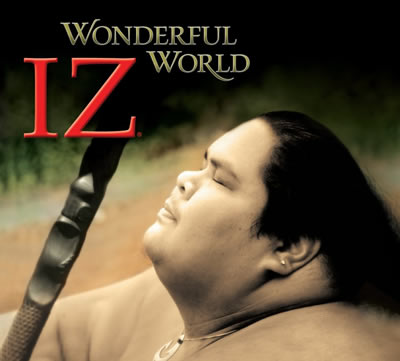Lesson 3: Culture and Mental Illness
Attention
Three questions that may not be easily answered:
The meaning of life,
The definition of reality,
The relationship of nature to nurture.

While writing this introduction to Lesson 3, I am listening to lyric and music by Israel Kamakawiwo'ole, Iz for short.
I am being transported cognitively and emotionally to thoughts and feelings from childhood through music.
Why does music "move" so?
Is it because it is a message sent over time by a given culture, and in this instance, Iz's sweet and gentle interpretations of classic pieces. He and I, same brain, same auditory systems, BUT, different time and place. Our roots differ. A working definition of culture.
This Lesson will be about the nature of nurture.
Learning Outcomes
Upon completion of this lesson's material, students will be able to:
- Define culture, ethnicity, and race.
- Explain the nature and extent of mental health disparities.
- Describe promising directions toward the elimination of mental health disparities and the promotion of mental health.
Teaching
Reading
- Additionally, on reserve in Lunder Library is material by Spencer Wells on his research into the migration and genetics of human ancestry.
Spencer Wells TED Talk
Lecture
Spencer Wells has traced a genetic "marker" across the entire contemporary world- just ONE pair of organic bases in the three-billion base pairs that contribute to human genetics. This "mispelling,' according to him, originates in a group of people who lived on the east coast of Africa some 60,000 years ago. A few of you, with whom I have had previous classes, know that I have a dinosaur egg, fossalized, of course, dating anywhere from 66 to 120 MILLION years age. So, Wells' work is relatively contemporary. By the way, if you view the video in library with Spencer Wells, "Journey of Man," you will see Wells extract DNA from a blood sample. More importantly, he will do an electrogelphorisis on it, and create a computer assisted graphic of the DNA from that particular donor. It is within that visual display, that he searches for just one pair of organic bases that are "incorrectly" paired. Guess what? Tracing such ancestry for only males, because males transmit from father to sons fairly unalterd DNA on the Y chromosome from one generation to the next, he has confirmed that ALL people, all over the world , could share a common ancestry. He does not find marker in everyone, but, he has found the marker EVERYWHERE nonethelss. One conclusion could be that we are all related to each other!!!
Please note, however. There IS an alternate position here. It is based on a creationist perspective, that does NOT fall back on science, theory, or new/newest speculation!
When we look at differences between individuals and conclude that they are "born" that way, this would be the nature perspective on human behavior. The alternate position is that nurture, life's experience within a given context, culture, grooms the differences we think are heredity.
Review this Wikipedia entry for Culture Bound Syndromes. For the last several diagnostic manuals from the American Psychiatric Association, there has been an index for psychiatric conditions that could be seen clinically, but by a mental health professional who did not intern, or see in residency anything other than what was from culture into which they were born.
In 2011, Oliver Sacks published an amazing book, entitled "Hallucinations." He describes his many, many years as a world travelling and culture-curious neurologist. Syndromes, for which patients may fear reporting to family, friends, mental health staff, or even believing they themselves are experiencing such altered states, MOST turn out to be common!
We look at the world, other people, and ourselves within particular boundaries. However, when the experiential line shifts, choice points occur. How well the field is trained is critical. Mis-diagnosis, missed-opportunity for diagnosis can be catastrophic.
The Mental Health & You app presents issues related to stigma. "MHU app teaches people to recognize the signs of mental illness and provides resource links to treatments. Our app will give you the tools you need to help you assess a mental health crisis, provide help, and connect your friend or loved one to the resources they need."
|
I have used another video, "Broken Minds," which I had KVCC purchase. It is on reserve in Lunder Library. A central person in the program is David Taggert. He is seen again, and again. He is offered treatment, but must agree to be medicated. He refuses, believing he is not ill enough to warrant this.
The shocker here is that on a one year follow-up to the program, we learn that David Taggert died. He was retrieved from the East River in March or April. Way too cold for survival more than 15 or 20 minutes. BUT, before he died, he asked for psychiatric care, but was denied. He did not appear to be ill enough for in-patient treament for three hospitals at which he presented!
We need to be able to see both the clinical, and the individual in every instance. Any contact with the mental health field is a critical juncture for someone seeking help. Failure to see illness when it is real and present is part of the problem The context, or culture within which someone needs help is EVERYTHING. If the micrsope is too weak, the telescope not strong enough, we need to be re-imagine the system.
Assessment
Lesson 3 Quiz
Click HERE to review the following article. In this article there is a graphic (p. 5) outlining the Purnell Model of Cultural Competence.
There are twelve parameters within the outer "rings" of global society, community, family, and person. It is a schematic for sensitizing practioners to the complexity of real world casework issues. Put yourself in the role of a mental health professional in your community. It is interesting to note that the new Diagnostic and Statistical Manual- Five, 2013, has moved AWAY from a multi-axial diagnostic perspective. That was a landmark addition and accomplishment DSM-IIII, in 1980. It was meant to give a more "rounded" or complete description of a patient. Remember. You have read the Rosenhan artcile, in which labelling, i.e., a diagnosis became more important that the behavior of the pseudopatients. There was nothing wrong with them. They only pretended to be troubled to see if they could fool the professionals. Unfortunately, once they were taken on as in-patient, AND stopped pretending, the tentative diagnosis (on intake), was more important than their being in fact NORMAL.
- Here is your chance to be Dr. Phil. Pick any three of the 12 parameters in the Purnell Model, and explain how and why they would help in seeing more deeply into an individuals' needs and concerns as a patient. This is a VERY challenging question. You need to really think through what it would feel like if YOU had a behavioral issue and sought help.
Lesson 3 Discussion
Throughout all your personal development and history, nature and nurture have been interacting. However, there may welll have been life-changing moments, either physical, i.e., illness onset and survival, or personal junctures that standout. Discuss the relationship between nature and nurture in YOUR experience.
I know. I know. This is an "old" question. But, failure to understand the complexity here, and the shifting salience of each component can have realworld consequences.

